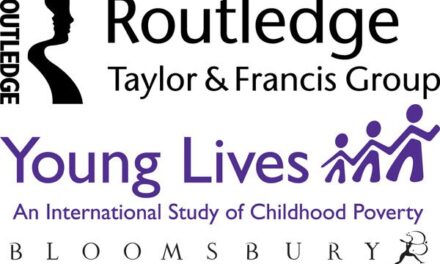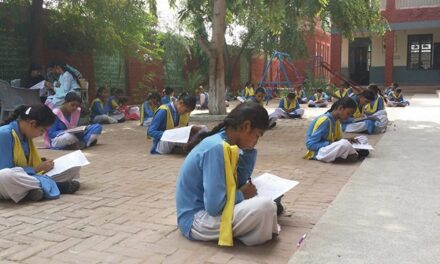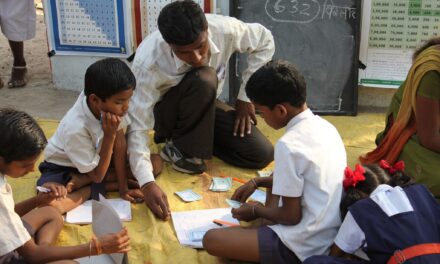This blog was originally posted on the Center for Education Innovations blog on 25 September 2017. Re-posted with permission.
Oxford in September, for what must be my eighth UKFIET conference, and each time I’ve been progressively more at home with the debates and less awed by the presentations. But on Tuesday evening I stood in a room with many of the people that I have respected for years. Authors of papers that pointed me in the right direction, or that opened my eyes to something different or a new way of seeing my work in education in development. I felt I was in the presence of greatness. One presence was there, but not there – the reason we were gathered – to remember Chris Colclough of the smiley eyes, the listening ears and the wise brain.
The next evening, I floated in a canoe down the unexpectedly picturesque Oxford canal to a garden gathering of another group of highly-informed people, generally younger this time, but no less influential. We discussed the lack of focus on Early Childhood Development and Early Years to ensure that children are ready to learn what seem to be elusive foundational literacy and numeracy skills; the numerous reasons why girls are not learning as much or as quickly as we’d like; and how you might approach prickly issues of low learning and entrenched gender norms in a way that keeps governments and communities on board and doesn’t alienate them. Some four hours of illuminating and intellectually stimulating conversation – and none of it actually in the conference! But that’s the beauty of UKFIET – borne out by conference participants’ voting for ‘making new connections’ as the most valuable part of the conference just before we heard Malala Yousufzai and her father speak (more awe!).
 That’s not in any way to say that the actual formal part of the conference wasn’t equally awesome though. With age has come a small degree of wisdom and instead of flitting about through a myriad of different themes and varied contexts, this time I decided that apart from attending the Girls’ Education Challenge (GEC) sessions of course, I’d concentrate on one theme – Teachers. Here I proved myself to be completely representative of the conference population on two fronts: Gender equality being seen by participants as the most important other SDG to work on SDG4 and Professional Development for Teachers being the primus inter pares of actions to work towards SDG 4.
That’s not in any way to say that the actual formal part of the conference wasn’t equally awesome though. With age has come a small degree of wisdom and instead of flitting about through a myriad of different themes and varied contexts, this time I decided that apart from attending the Girls’ Education Challenge (GEC) sessions of course, I’d concentrate on one theme – Teachers. Here I proved myself to be completely representative of the conference population on two fronts: Gender equality being seen by participants as the most important other SDG to work on SDG4 and Professional Development for Teachers being the primus inter pares of actions to work towards SDG 4.
It seems that teachers’ biggest motivation is to see children learn (unsurprisingly) and the Education Commission is recommending some policy borrowing from the Health sector. This includes introducing a cadre of support and admin staff which would free up teachers’ time to concentrate on actually teaching and supporting teachers to support each other through facilitated professional (teacher and head teacher) networks and programmes which give them certification and recognise their achievements. Similar ideas seem to be taking shape across many countries in Africa and Asia (STIR) and teacher peer support networks are something we’ve seen successfully emerging in the GEC too. In Ghana, the entire teacher education system is being reformed following extensive stakeholder involvement at every level.
 Another aspect that we have grappled with on the GEC, and which resonated in a number of presentations, was that of sustaining the gains made through better teaching and learning. It was heartening to see that there is thinking which seems to agree with the main elements of our emerging sustainability framework: once effectiveness has been evidenced (as we have done on the GEC), and all relevant stakeholders have bought into the potential of the interventions (another aspect that GEC projects have had some success in), then the next steps are to ensure that there is sufficient organisational and institutional capacity to continue to offer the same intervention with the requisite fidelity (see EQUIP-T, ASI Pakistan). Sustaining the upskilling and support of teachers also requires affordability and the work done by the GEC Fund Manager seems to have similar roots, but perhaps goes a little further than that of OPM, in trying to tie down ways of analysing cost effectiveness within the 4Es framework.
Another aspect that we have grappled with on the GEC, and which resonated in a number of presentations, was that of sustaining the gains made through better teaching and learning. It was heartening to see that there is thinking which seems to agree with the main elements of our emerging sustainability framework: once effectiveness has been evidenced (as we have done on the GEC), and all relevant stakeholders have bought into the potential of the interventions (another aspect that GEC projects have had some success in), then the next steps are to ensure that there is sufficient organisational and institutional capacity to continue to offer the same intervention with the requisite fidelity (see EQUIP-T, ASI Pakistan). Sustaining the upskilling and support of teachers also requires affordability and the work done by the GEC Fund Manager seems to have similar roots, but perhaps goes a little further than that of OPM, in trying to tie down ways of analysing cost effectiveness within the 4Es framework.
The continuing challenges to improving teaching and learning were also shared by many and institutional and organisational issues, sources of power and influence (Hinton) , de jure and de facto policy implementation (see North and Unterhalter and the session papers on Language of Instruction) and the long and arduous road to changing social norms featured strongly in many presentations as continuing barriers that we all need to recognise earlier and with more focus if we are to sustain gains made or take promising interventions to scale.
Happily, there were many examples of tools that were being developed to assist in sharpening our analysis or our focus on the right things with the right groups of girls, not least the GEC Marginalisation framework which was very well received and UNGEI’s gender focused framework for analysis of sector plans.
Shared experience, converging ideas, healthy debate and a refreshingly positive attitude will definitely see me back again amongst the hallowed spires at UKFIET 2018.
–
Christine Wallace is a senior technical adviser for the Girls’ Education Challenge. She has been working in international development for the last 30 years for INGOs, UN agencies, DFID and the European Union. She joined the Girls’ Education Challenge in 2012.
Photo Credits: Cycling Man ; Jessica Lea/Department for International Development ; UKFIET ; The Education Commission





